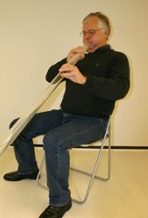
03-06-2015. Nocturnal snoring not only disrupts the sleep of your bed mates. Snorers also suffer from their involuntary sleep noises. The so-called obstructive sleep apnea syndrome leads not only to heavy snoring at night, but also to restless sleep and daytime tiredness. Most of the symptoms are treated conventionally with nocturnal hypertension breathing (CPAP therapy). The snorer wears a nasal mask through which the breath is humidified. This leads to a relief of the symptoms.
A study by the Zurich research team Otto Brändli and Milo Puhan already presented an alternative treatment approach in 2005: regular play on a didgeridoo. 25 patients with mild sleep apnea syndrome participated in the study. These subjects were randomly assigned to a Digeridoo group and a control group. After 4 months and 20 minutes of daily practice, a clear improvement in sleep apnea was found in the Digeridoo players. There was also a significantly lower daytime tiredness compared to the control group. The partners of the study participants also felt much less disturbed at night. (Puhan et al. 2005)
In Northern Germany, Digeridoo teacher Jürgen Breuninger offers Digeridoo training to patients with sleep apnea. In addition, he also trains therapists in the Digeridoo game so that they can use the instrument individually in therapeutic work.
The exercise program, which comes from England, offers a further musical approach to treatment Siniging for Snorers by Alise Ojay. Targeted singing exercises should train and strengthen the upper respiratory tract. A pilot study with 20 patients examined the effects of regular singing training. The participants practiced for 20 minutes every day for 3 months. Particularly normal-weight snores, who also started to snore only in middle age, benefited significantly from the singing training. (Ojay et al. 2000)